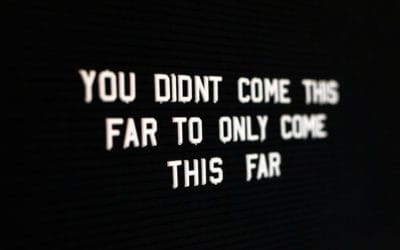Over 50% of physicians will change jobs within two to five years after taking their first job. That’s a pretty staggering number. It is not surprising, though. While we can be dedicated and loyal employees, we also realize that hospitals do not always love us back. For this reason, it is necessary for physicians to protect themselves when it comes to their relationship with their employers. Today, I want to explore one essential technique to setting expectations at work through drawing lines in the sand.
Expectations and Reality
It is one of my life’s philosophies that expectations and reality are entirely responsible for determining someone’s happiness. Whether someone finds themselves happy or severely disappointed in any relationship depends entirely on how closely reality lines up with their prior expectation. This includes marriage, friendship, and even our relationship with our employer.
For example, if you have the expectation to have a big family, and you find out two years into marriage your spouse has no interest in kids… that is a recipe for disaster. It really comes down to the fact that you had an expectation for one thing, and reality ended up being very different.
Similarly, if you expect to be on call three times per month when you take a job, and you find that you are on call every fourth night after taking the position… you will likely join the 50% of physicians who change jobs two to five years after starting a new gig.
For this reason, it is absolutely paramount to set expectations in any relationship.
In the business world, this happens initially through a contract, which should be reviewed. However, it doesn’t stop there. Expectations will continually be set throughout your life as a working physician.
The key is to draw lines in the sand that clearly demarcate what you are and are not willing to do. Then you must stick to it! When reality is very different than your clearly stated expectations, you have a complete and professional right to walk away.
Here are four examples of lines that are worth drawing in the sand.
1. Committees
As a young faculty member, people love to get us involved in committees. The reasoning is that we are just starting our careers. Surely, we must have more time to spare than older faculty members who are already committed to other projects.
The problem is that many young faculty members also have young families. That’s certainly the case for my household of five where we have three kids all less than 10 years old. This is one of the many reasons I created my Hell Yes Policy. These days, if something doesn’t make me say “Hell, Yes!” then I simple say, “nope!”
It is easy for physicians to clutter their schedule with unnecessary (and often unhelpful) meetings. Due to the fact that I am actively working to find better work-life balance, whenever I join committees I now set expectations by drawing lines in the sand.
A Real Life Example
For example – on the rare occasion that I say yes to a committee – I say something like this, “I’d be happy to join that committee, but I will not be attending on days that I am not working clinically. So, I anticipate meetings being scheduled on my working days. If not, I’ll likely be unable to attend, though I expect there to be electronic ways of making the meetings.“
In a recent committee I joined the above didn’t happen.
So, after two meetings were scheduled on days I wasn’t working and there was no electronic means to make the meeting, I asked them to remove my name from the committee. Magically, the next meeting (and every meeting thereafter) has been scheduled on a day I am working or a call-in option was made available. This is because I drew a line in the sand.
In addition to the above, I’ll often tell people when I come into a meeting that I have exactly one hour for the meeting. That way, when the meeting starts to go over, I can get up and say I have to leave. Because I set the expectation at the beginning, I am not being rude. I am simply holding to my stated expectation.
2. Emails and Texts
I used to pride myself on being constantly available for other people. It was important to me that people could depend on me to be there when they needed me. One day, I realized that this was both unnecessary and unhealthy.
In fact, one of the best pieces of advice that I ever got was to detach myself from being constantly available. It helps me to live in the moment. And that leads to a life of contentment.
For this reason, I now push my work emails to my phone every 12 hours. And soon enough, I’ll be taking them off of my phone completely. This will allow me to not get distracted in the present, and to actually do a good job checking my email when I do it. (Surely, I am not the only person who opens an email and forgets to respond because I am doing something else).
Similarly, when I get home, the phone now goes on silent until my kids are in bed. In addition to this, I’ve encouraged my wife and children to tell me when I am spending too much time looking at a screen of any kind. I should be interacting with them instead, and I want them to hold me accountable to that.
These two lines in the sand have been really helpful for my work-life relationship. Very few things when I am not on call are an emergency. I now treat them with the priority that they deserve, which is when my family is not around.
3. The Most Valuable Commodity
The most valuable commodity that we have in life is not money. It’s our time. It is the most finite resource in existence.
For this reason, I take my schedule very seriously. Recently, I’ve had to draw lines in the sand with my schedule.
It has been well-documented on this blog that – while I love my job – I work a lot more than I want. I’ve averaged 1.3 FTE the last two years. The reason for this is that our anesthesia department has expanded rapidly since the year that I joined the faculty. Truthfully, it is a wonderful place to work, but we have had trouble keeping pace with the expansion of services we now provide.
So, when scheduling conversations came up recently, I made it clear that I want to be working 1 FTE as soon as possible. The line in the sand has officially been drawn.
This would allow me to find the balance I need at work to achieve my clinical, research, and educational goals (like creating a personal finance curriculum). In addition, this gives me the time I need for my family and for this blog, which has become a huge passion of mine.
When others press on your time, I encourage you to draw lines in the sand, too. Otherwise, you are allowing others to take the most valuable resource that you have. And you won’t ever be able to get that time back.
4. A Lack of Resources
This is probably the easiest line in the sand to draw. When someone asks you for something, they better provide the help.
For example, if someone wants me to do more research while I work 1.3 FTE, create multiple curricular activities, teach, and balance my home life… they better provide some research help. Otherwise, it isn’t going to happen.
That is an expectation that I’ve set a lot lately. “I’d love to help you with that, but I simply don’t have the resources. Sorry.” What can they say?
If you find someone tasking you with a project, make sure that you lay out the expectations. Otherwise, you are better off just saying no. Draw the line in the sand.
Take Home
As an employee, it is unreasonable for others to expect that you are the only one that should hold up your end up the bargain. Your administrators and employers must do the same. Otherwise, that is a recipe for burnout.
Don’t suffer from Someday Syndrome. Demand the life you want to live right now. Draw lines in the sand and set expectations. When they aren’t met, you have the right to walk away from it if things don’t change.
After all, if you don’t have a seat at the table, you are likely on the menu. Demand the seat you deserve.
Do you struggle with setting expectations at work? Does your work dictate your expectations? Where can you draw lines in the sand? Leave a comment below.
TPP





This is a great post.
I would add for the younger attendings you have to think strategically when you take on extra nonclinical work. If you engage in something do it with a purpose for your career goals. Early on in my career (2 years into being an attending) I had the opportunity to take on a role in health care IT as a physician liaison which I took. It was not for any money (since the idea was that I would “trade” my currently nonclinical time, which truthfully at that point was spent dabbling in various projects). I ended up definitely working more hours of nonclinical time than I had been previously. However, in the long run it paid off since 3 years later when our division was restructuring I became director based on performance and my exposure at a hospital level.
Definitely true. Opportunities can arise from responsibilities like that. Doing it intentionally (with an eye on your career goals) is fantastic advice.
Excellent advice overall.
I would add two exceptions or caveats:
1. Committees provide a great opportunity for young docs to get to know the power physicians and administrators in their Hospitals. I used this to my advantage early in my career.
2. Sometimes I agree to participate in an extracurricular that I have no interest in doing as a de facto bargaining chip to get something else.
I currently have one such responsibility that has generated enough goodwill with the Chairman such that I am otherwise able to have quite a bit of freedom for just about everything else. In that respect, think you have to look at your overall portfolio of responsibilities, not just one in isolation. I see my younger, less experienced colleagues making that mistake.
Definitely something I’ve fallen prey to, Vagabond! Keeping the whole picture in view is key.
At my institution, there is a 3 year trial period before you are considered for partnership. During this time I’ve adopted a “sure, how can I help policy.”
Now I’m at the end of my trial period, and I find myself on 2 committees and am in charge of various administrative annoyances for the department.
If all goes well with the partnership vote, I’ll be drawing my own “Line in the sand.”
Thanks for the post!
— TDD
Definitely a good idea to be “partner worthy” during the partner trial period. Just gotta make sure you don’t overcommit.
I don’t typically have time to read the many blog posts that hit my inbox (drawing a personal line, I suppose) but this topic is a particular pet peeve and drew my attention. Always helpful in my practice to have insight into the physician world from doctors who ruminate and share perspective on everyday problems. Your tips are helpful and will, I believe, resonate with both new attendings and those who struggle with over-commitment. The suggestions from your seasoned readers are also fantastic. Thanks for the thoughtful advice.
Thanks for visiting, Johanna. I think this is an important lesson for people so that they can maintain the balance they are looking for without over extending themselves.
Thanks for the comment!
A lot of this is very reminiscent of a book I read called “Essentialism” by Greg McKeown. If you aren’t familiar, I think a lot of it would resonate. In particular he has a line about mastering “the fast no and the slow yes” which is very reminiscent of your “Hell Yes” policy. He also talks about a variation on the bait and switch – I can’t do X, but I can do Y. Which, makes the “No” land less hard for the person. And, if they don’t want Y, then they said no, not you.
Boundaries are a difficult thing to hold in Medicine as they are not valued by the overarching culture and structure. I had to quit one gig and switch to Locums to get them respected. I read this book after I had given notice at my old job, and it just made me realize how the culture of the place would never allow me to have the boundaries I wanted. It helped me feel better about leaving.
I love “the fast no and slow yes” idea! That is great, and the same exact idea. I’ll have to check the book out.
If you cannot find the boundaries you are looking for, changing jobs or leaving all together may be the only choice that remains.